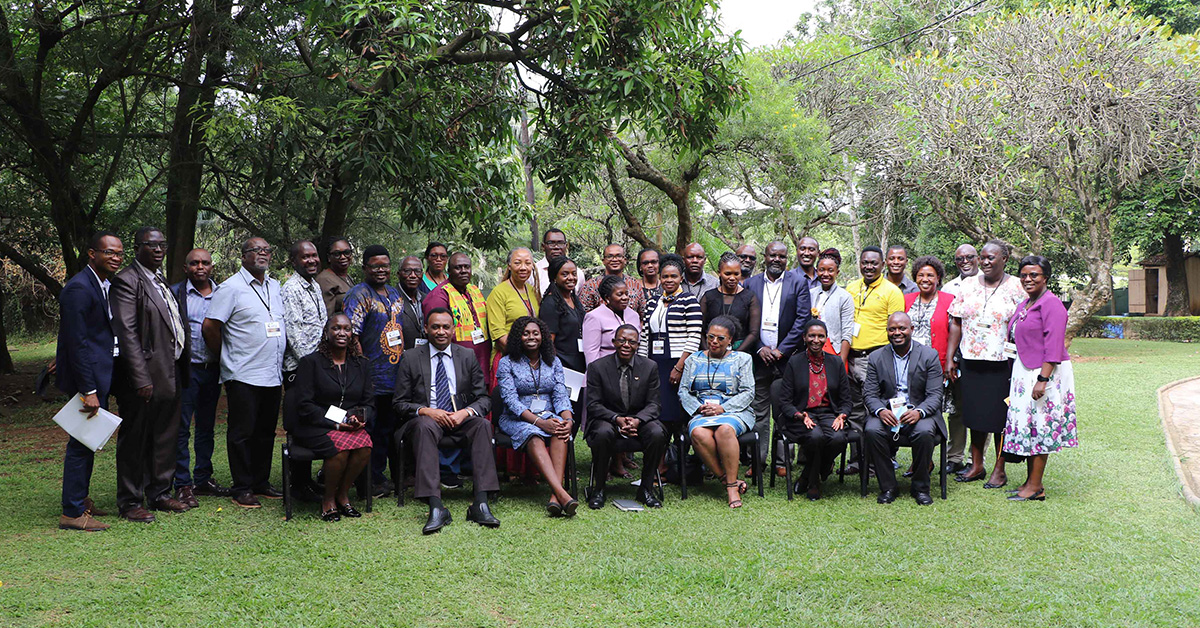As we work towards the sustainability and upscaling of gains, CARTA has kicked off Training of Trainers (ToT) Workshops that aim to strengthen the capacity of partner institutions to adopt and independently carry out different CARTA interventions. These interventions comprise of the Joint Advanced Seminars (JASes) for PhD training; Supervisors Workshop (SW) to strengthen postgraduate supervision; Graduate Workshop (GW) to strengthen grant development capacities; and the Academic, Professional and Administrative Staff (APAS) Workshop to strengthen research and post-graduate and research training capacity and processes.
Central to CARTA’s Theory of Change (ToC) is a critical mass of well-trained and motivated researchers, supported by a conducive environment. In the endeavour to create this environment, CARTA recognizes that different functionalities – academic and administrative university staff – play a critical role. CARTA therefore regularly brings together academic and administrative staff, through APAS seminars to understand each other’s roles, appreciate how they complement each other, and take action to make them more effective in their roles to support research and research training.
The participants include finance officers, deans or directors of graduate schools, academic deans, librarians, procurement officers, registrars, IT staff, and many others. Using participatory learning and teaching methods, the APAS seminars equip the participants to be more responsive to, and supportive of research, research capacity strengthening and early career researchers at doctoral and postdoctoral levels. They get to appreciate the significance of their work in the wider context of the development needs of the continent in general and in the transformational role of academic institutions in particular. Further, they also get to understand possible barriers of the PhD training processes in their institutions.
The first of the CARTA ToT workshops to be held was the APAS ToT, previously known as Faculty and Administrative Staff (FAS) seminar). This ToT took place at the School of Public Health at Makerere University, Uganda from June 6 to 10, 2022.
Cognizant of the fact that the APAS seminars aim to strengthen institutional responsiveness to graduate training and research in Africa, the APAS ToT workshop aimed to empower the participants, who are potential institutional-based facilitators, to effectively coordinate and co-facilitate APAS workshops at their respective institutions. The participants, having been nominated by their respective Vice Chancellors, included those involved in postgraduate training, CARTA graduates past FAS participants; those who occupied positions that would facilitate APAS training workshops in their institutions; and individuals involved in CARTA activities.
The participants and facilitators benefitted from opening remarks by Prof. Sharon Fonn – CARTA, Co-Director; Prof. Buyinza Mukadasi – Director, Directorate of Research and Graduate Training (DRGT); and Prof. Elizeus Rutebemberwa – the acting. Dean, Makerere University School of Public Health. Prof. Buyinza, who is one of the CARTA focal persons at Makerere University and the institutional coordinator of the Norhed Program* called on the trainees to try out the CARTA model and implement the lessons from the ToT in their respective institutions. “Our business [CARTA and partners] is to build the next generation of African academics, and that means building the capacity of researchers and universities to become independent. We have done this over the years because of the innovative CARTA model,” he said.
In his remarks, Prof Rutebemberwa lauded CARTA’s capacity building efforts both at individual and institutional levels. He said, “It is a pleasure to see that CARTA has shifted from the agents – PhD candidates trained and perpetuated to ToTs which will bring in a lasting culture. 50 or 100 years from now we can identify what CARTA has been and has done.”
According to Prof Shonn, universities do a lot to support undergraduate studies, but seemingly not so much for postgraduate studies. Yet, it is the postgraduate level that allows us to meet development goals. For researchers to generate quality research and play this role, they require conducive environments. APAS workshops particularly look to address this.
During the APAS ToT workshop in Makerere, participants got an opportunity to explore and use the APAS ToT training manual as a way of familiarising themselves with the workshop and activities that they will hopefully be facilitating at their own institutions. Additionally, the participants explored and practised various training methods, using CARTA techniques.
Overall, the participatory and interactive method (at the core of the CARTA way of teaching) was highly appreciated with one participant reporting that, “the different methods in the workshop nullified monotony and encouraged interaction among participants.” Another said that, “it is practical, very relaxing, and friendly. It [the workshop] provided the opportunity to learn from one another’s problems.”
At the end of the ToT workshop, teams from each of African Partner Universities developed and submitted working step down institutional plans and strategies for APAS workshops and related interventions at their universities.
Having had a successful APAS ToT Workshop, plans are underway for ToTs of SW, JASes and GW that will take place within the year at the Kamuzu University of Health Sciences (KUHeS) – Malawi, University of Rwanda and at the African Population and Health Research Center (APHRC) – Kenya, respectively.
*The CARTA course review, development of the ToT workshop course and the ToT workshops are funded by the Norwegian Programme for Capacity Development in Higher Education and Research for Development (NORHED), the Swedish International Development Cooperation Agency (Sida) and the Carnegie Corporation of New York, as part of efforts to promote sustainability of CARTA interventions.




